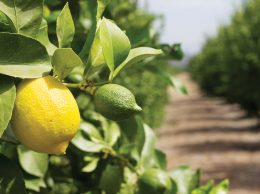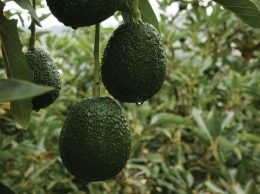
Henry Dubroff
One of the cool things about covering business in the Tri-Counties is that at least once a year we get a pretty close look at what’s happening at one of the region’s largest agribusiness holding companies.
That’s because Santa Paula-based Limoneira Co., founded in 1893, happens to be a publicly traded company. The company began making disclosures about a decade ago, when successive generations of family stock ownership pushed the number of shareholders past the 500 threshold that required Securities and Exchange Commission filings.
Rather than try to remain private, CEO Harold Edwards opted for making it easier for family members to cash out. And today, Limoneira is a Nasdaq-listed company that last year sold 2.1 million shares of stock to the public, raising $38.3 million in new cash. It also happens to be a global leader in the production of lemons and avocados, a significant landowner and a major holder of water rights in California.
That puts it at the epicenter of some of the key economic issues of our time. I caught up with Edwards by phone shortly after a lengthy presentation at the Limoneira annual shareholders meeting on March 26.
Limoneira had a very good year in 2013, with $5 million in profits on $85 million in revenue. That’s up from $3.2 million in profits on $66 million in revenue a year earlier. The growth is in part due to a 30 percent expansion of its lemon business, with 2,085 acres added last year through large acquisitions.
My first takeaway from my chat with Edwards is that we are seeing the beginning of pricing power return to parts of the food business. Lemon prices were strong last year, and thanks in part to a freeze in the Central Valley over the winter, lemon prices are rising again.
If the Federal Reserve wants to see a bit of inflation in commodity prices, Limoneira is doing its part, with per-case prices going from about $17 last year to the $22-$23 range. “There’s been a huge positive impact on pricing,” he said.
The second takeaway is the growing influence of water and water pricing throughout California’s economy. On March 25, Limoneira announced a complex financing involving selling preferred shares to a partnership that invested $9.3 million in cash to gain access to some of Limonera’s water rights.
One of the benefits of its recent acquisitions, Edwards said, is that Limoneira owns Class 3 rights to Colorado River water, putting it ahead of Phoenix or Scottsdale in priority. That’s a lot of leverage.
If California’s drought continues, there will be a big opportunity for large agribusiness users such as Limoneira to become a lot more efficient in using water so that it can sell surplus supplies for a profit.
Right now, there’s not an easy way to monetize water holdings, but that day may not be too far away. If it rains, some of those bets may come off the table, but Limoneira’s costs will go down.
Meanwhile, the vagaries of large-scale housing development anywhere Tri-Counties are a bit like the Green Monster at Fenway Park. They giveth and taketh. Just a few years ago, it looked like Limoneira would have to wait years to get its East Area I, now called Santa Paula Gateway, project off the ground.
But California’s rebounding home building market means that the company’s plan to breaking ground in early 2015 will attract homebuilders interested in taking down lots ranging from 20 to 100 properties.
But it’s hard to be a true contrarian. With the Federal Reserve talking about ending its zero interest rate policy next year, Limoneira has been moving to reduce debt, taking $27 million in long-term obligations off the balance sheet last year. It still would like to find partners who will finance some of the expensive infrastructure needed to get the Gateway Project built. And no business based in agriculture can escape the seasonal nature of farming.
A first-quarter loss sent Limoneira’s stock down this year, but Edwards said that’s just the way it is in farming. Wall Street, he said was “misreading the seasonality of our business.”
Limoneira so far has managed to navigate the financial crisis and drought and keep expanding. But there are still plenty of issues on the table as it balances its agribusiness roots with real estate and water issues. As the late Gilda Radner would say, “It’s always something.”
• Contact Henry Dubroff at hdubroff@pacbiztimes.com.






 Print
Print Email
Email
















